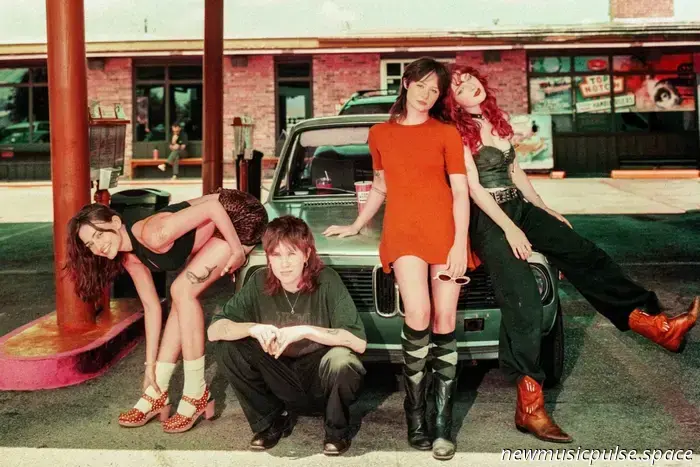
“The continuity of the ego is a myth.” This phrase by playwright Bertolt Brecht encapsulated a latent idea for London-based singer, songwriter, and producer LEILAH: the notion that identity is anchored in time and place, and that adopting various personas might be the ultimate act of bravery.
Collaborations with artists like salute, Speakers Corner Quartet, and SBTRKT showcased LEILAH as a fluid entity—an enigmatic figure who navigates with agility. However, ‘LOST THE PLOT’ sheds this elusive energy, instead providing a theatrical exploration of what it means to be deconstructed, artistically stifled, and ultimately rejuvenated across eight tracks.
This extensive release delves into themes of love as a void and the everyday challenges faced by a working artist, all set against a backdrop of a perpetually deteriorating metropolis. ‘LOST THE PLOT’ offers a trippy interpretation of electrified pop: think reverberating vocals, loose beats that bounce and glide, and somber synths evoking a spectral haze.
In an interview with CLASH, LEILAH discussed how collaboration has honed her musical sensibility, how anonymity has granted her greater control, and why the transitional EP ‘LOST THE PLOT’ symbolizes the end of one character and the rebirth of another unconventional version.
—
—
To start, I want to express that I’m a big fan of LEILAH. I've followed your journey for several years, and I'm thrilled to spotlight you at this point in your career.
Thank you so much! Being interviewed by you and CLASH means a great deal to me. You’ve always shown tremendous support.
Let's talk about young LEILAH. Who were you before you entered the music scene? When did music begin to shape your perspective on the world?
Music has always been a constant in my life, but as a child, I aspired to be a teacher, then an author—I often wrote and shared short stories with friends in class—before eventually wanting to be a psychologist. However, my mum tells me that when I was seven, the first career I wanted was to be a singer. The career advisor at school dismissed it as not a real job and said he’d get back to me, which made me come home in tears! (laughs)
Which three albums by other artists best reflect your musical preferences?
Currently, the ones I've revisited most often are: ‘Anti’ by Rihanna, ‘Renaissance’ by Beyoncé, and ‘I Forget Where We Were’ by Ben Howard. Ben Howard is always relevant for me.
You’ve lent your vocals to tracks by SBTRKT, Mura Masa, Speakers Corner Quartet, salute, and more. How have these collaborations, primarily in the dance and electronic genres, influenced your artistry?
They have greatly broadened my musical horizons. The types of tracks I’ve had to write and create continuously challenge me. It can be hectic when producers play a track, but finding the right groove and how to style my voice and writing to ensure the end result feels effortless is exhilarating. This experience has enriched my musical sensibility for my own songs.
From those collaborations, which is your personal favorite?
It’s tough to choose, but I'd say Speakers Corner Quartet stands out. Working with them is a transformative experience, and I often talk about it. They excel at creating an environment that draws out the purest form of art from the artists they collaborate with. I could go on about them endlessly.
You've incorporated theatrical elements and "acts" into your music since your debut. Listening to ‘Intermission’ felt like engaging with a dramatic monologue. Where does your passion for storytelling and embodying different characters originate?
(laughs) Yes! You got it! From a young age, I have always been deeply affected by fiction and the idea that we can be whoever we choose. As an artist, I have the opportunity to embody that belief and create new worlds.
There’s an aspect of anonymity in your public persona. Is this a form of self-preservation? Do you prefer to keep the focus on your music and world-building?
Absolutely. I believe my music and lyrics should take precedence over everything else. The mystery surrounding me has also become a form of defiance. While I often meet people during sessions, I realized that plastering my face, body, or personal life online wasn’t a choice but an expectation for achieving 'success' in music. Maintaining control over my image and how and when I present it has turned out to be far more meaningful than I anticipated.
Reflecting on 2023, you released a series of standalone singles. How do you perceive that output now? What occurred immediately after?
I was creating music as a developing artist. I made a lot of music with different collaborators, but many ideas and projects didn’t come to fruition due to financial constraints. This led to a slowdown in my creativity. It was a series of unfortunate events that inspired



Alice Phoebe Lou is set to release her new album 'Oblivion' on October 24th. This upcoming project showcases the songwriter revisiting her archive and reflecting on her past.
![BMW
The latest car news and reviews, without the fluff.
Our complimentary daily newsletter delivers the important stories straight to your inbox every weekday.
Hello, I’m Byron, and I consider ADAS to be a four-letter word.
No, that’s not something your phone can translate. ADAS stands for "Advanced Driver Assistance Systems," which is a vague term that encompasses any software-based safety mechanism that provides a digital buffer between you and your surroundings. Systems like lane keeping assist, automatic emergency braking, adaptive cruise control—and even Tesla’s so-called Full Self-Driving—fall under this category. In general, I’m not a fan of any of them.
It’s not that they are inherently bad—though one could argue otherwise from a behavioral perspective. My issue lies with their tendency to overstep their role, intervening when they are neither necessary nor appreciated. Few things are as annoying as battling against an electronic assistant trying to protect me from myself.
Imagine this:
You’re driving on a two-lane rural road and enter a small town. Approaching a busy district, you encounter a delivery truck blocking your lane. There’s no oncoming traffic, so you cautiously steer your car into the opposite lane to pass.
BEEP BEEP BEEP! BEEP BEEP BEEP!
That's your lane departure warning, of course. Now the lane keeping assist is attempting to nudge the steering wheel back to the right, despite the parked truck in the way. You rapidly steer left again, overriding the system. Then you complete your pass and continue on your way. Or, if you’re like me, you end up spending five minutes scrolling through menus trying to figure out how you forgot to disable that feature.
But there’s a newcomer in town, dressed in blue and white. It’s BMW! And its “superbrain” architecture is just what I need right now. Its superpower? Bestowing its new ADAS suite with the distinctive ability to do nothing at all. And no, I don’t mean you can turn it off; that capability is nearly a given. While I’m sure BMW has enhanced its object detection abilities and reduced false alarms, that’s not what I mean either.
I’m referring to a system that can essentially read your mind—or at least your eyes—well enough to know when it should act like a reformed back-seat driver and, well, stay quiet.
Let’s revisit that scenario, but this time we’re in a BMW Neue Klasse of some kind.
We approach the truck, systems fully active, and attempt the same maneuver, but this time, nothing occurs. Why? Because BMW has fine-tuned its software to recognize signs of intent.
When you scan for oncoming traffic in the adjacent lane, BMW’s eye sensor—capable of monitoring driver attention and even detecting early signs of drowsiness—catches your glance. When this look is paired with a corresponding steering motion, the system understands you’re acting deliberately. Unless it identifies a clear immediate safety hazard in your new direction, it won’t trigger any alarms or adjust your steering.
Instead? Silent compliance. Or, as I prefer to call it, the dream.
BMW’s new logic also facilitates smoother transitions between manual and autonomous driving modes, essentially removing the need to toggle them at all; the car will respond to inputs by relinquishing control to the driver. This only scratches the surface of what BMW's new electrical architecture is capable of; anticipate further intelligent system integration in the future.
Have a tip? Reach out to us at [email protected].](https://newmusicpulse.space/thumbs/newmusicpulse.space-700/d9/41/Armand-Hammer--The-Alchemist-Announce-New-Album-Mercy.webp)
Armand Hammer, which consists of rappers ELUCID and billy woods, along with producer The Alchemist, is set to release their new album 'Mercy' in November.

Strandz has launched his latest mixtape, 'Diaspora Dance Music'. Now available, the mixtape features the rapper positioning his sound within a club environment, accompanied by the beats.

Paloma León has launched her highly awaited album, ‘Piano Music for Movies.’ This project, more than ten years in the making, presents a modern interpretation of

Dodie has released her latest song titled 'Darling, Angel, Baby'. The talented songwriter's upcoming album, 'Not For Lack Of Trying', was revealed by none other than Jeff.

An intense and bold introduction.
“The continuity of the ego is a myth.” This statement from playwright Bertolt Brecht encapsulated something that was already present for the London-based singer and songwriter.